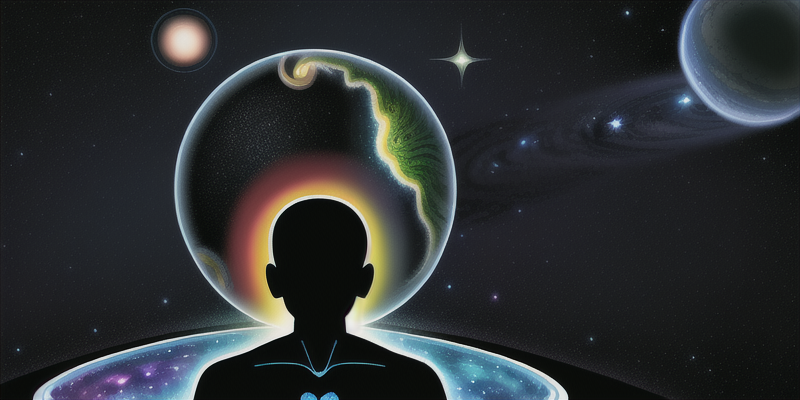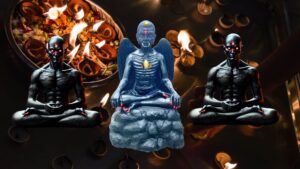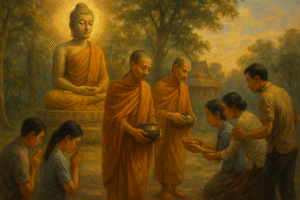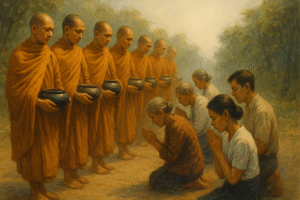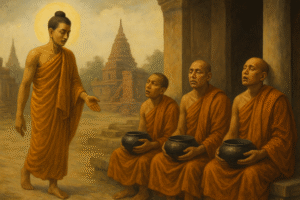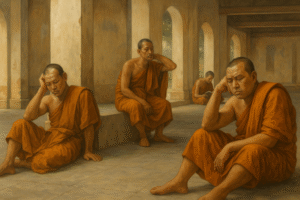In the boundless landscape of existential philosophies and spiritual ideologies, one idea has consistently transcended borders, cultures, and epochs: the concept of the soul. However, defining the soul is akin to describing the flavor of water or capturing a moonbeam within your hand; it eludes tangible articulation and exists only within the realm of subjective understanding and experience. It is, thus, more appropriately approached as a philosophical puzzle or a spiritual riddle than a definable concept.
Drawing parallels between understanding the soul and standing on the moon may seem strange at first, but let’s delve deeper. If I were to describe the lunar surface, I might say it’s rough and barren. Yet such description only offers a superficial understanding, one reliant on your personal experiences of ‘roughness’. The truth of the lunar surface, its holistic essence, remains far from your grasp. Such is the nature of understanding the soul: an unending chase of existential comprehension.
To unfold this enigma, consider the idea that the soul is born when consciousness arises, when life is lived in absolute awareness. It is when you grasp your desires and actions, when you recognize the mechanisms of your existence, and when you rise above them, that your soul finds birth. An unexamined life, a life lived mechanically, or a life surrendered to the whims of existence, might as well be soulless. So, it is soulless when we live instinctively, we merely exist. The soul is born when we live consciously, when we are truly living.
Animals, for example, follow their instincts without truly understanding the forces that drive them. They exist in the world, interact with their environment, but their existence remains essentially mechanistic, driven by biological imperatives and basic survival instincts. They seems to act out of instinct, not conscious thought. Despite their survival strategies appearing complex, their actions are mostly biological responses, devoid of deep contemplation. In many ways, we humans can similarly fall into the trap of living instinctively, mistaking it for rational thought.
The instinctive behaviors of animals present a compelling mirror to our human experience. Take, for example, a cat burying its litter. This act is a survival strategy, rooted in eons of evolutionary conditioning, an untaught response to the imperative of predator evasion. The cat does not ponder this action; it does not weigh the pros and cons or consider the potential outcomes. It simply acts, responding to the prompts wired into its biological hardware.
Such instinctive reactions, seamless and effortless, echo the unconscious mechanisms that drive much of human behavior. We often consider ourselves rational beings, masters of our own actions, and yet, how often do we truly ponder the roots of our actions? How often do we truly understand why we desire what we do, why we respond as we do, and why we live as we do?
The cat burying its litter is not so different from a human instinctively reaching for a glass of water when thirsty, or seeking companionship when lonely. These behaviors, while perhaps more complex, are still rooted in biological needs and instinctive responses. We assume that we’re making conscious, rational decisions, but more often than not, we are guided by instincts, desires, and habits that have been honed over thousands of years of evolution.
The journey towards understanding the soul, then, is a journey into self-awareness. It calls for a transcendence of these instinctive responses, a rising above the mechanistic and the habitual. The awakening of the soul can be seen as a move from instinctive existence to conscious living, from being a passive respondent to life’s stimuli to becoming an active, aware participant in the grand play of existence.
Understanding the soul means understanding our own mechanics, the deep-seated impulses and instinctive reactions that steer our lives. Only then, when we have transcended these unconscious drives and begun to consciously shape our own existence, can we claim to have truly awakened to our soul. The concept of the soul thus stands as a beacon, a guiding light on the path towards self-realization and conscious living.
Here, the metaphor of a dream becomes crucial. In dreams, we often feel that we’re thinking, deciding, and navigating rationally. Yet, aren’t we simply reacting to the fabricated realities presented to us? Aren’t we locked within an illusion that convinces us we’re rational, even though the dream itself is irrational? The idea of having a soul can be equated to this analogy. We may think we have one, but until we attain the level of consciousness that transcends our instinctive and mechanistic living, we might merely be dreaming of having a soul.
There is a paradoxical saying that the soul is born only after death. This notion, in a metaphorical sense, might signify that the birth of the soul is the awakening from the dream of unconscious existence, akin to a transcendental rebirth. It’s akin to a blind man seeing for the first time or finding an oasis in a desert; it’s not the physical eyes that are unveiled but the spiritual ones.
Imagine trying to see your own eyes without a mirror, a seemingly impossible endeavor. In much the same way, one cannot use the mind to analyze itself and expect a clear comprehension of the soul. The soul, if we go by this perspective, lies beyond the realm of ordinary cognition, beyond the clutches of mechanistic existence, and beyond the deceptions of the dreaming mind.
The idea of the soul, then, presents us with a formidable enigma that propels us to transcend the confines of ordinary consciousness and instinctive, mechanical living. We are summoned to a journey of realization, to awaken from the slumber of unconscious existence, and to attain a level of awareness that transcends the constraints of our biological selves.
A genuine understanding of the soul invites us to transcend the borders of ordinary cognition. It calls us to reach beyond the grasp of our instinctive actions, beyond the veils of our dreaming minds, and into the realm of absolute consciousness. It beckons us towards a higher plane of existence where we can discern the undercurrents of life’s ebb and flow. It presents itself not merely as a philosophical or religious concept, but as a profound challenge to awaken, to shake off the bindings of mechanistic existence, and to taste the purity of life’s essence. The soul, in this light, is a portal to transcendence, an invitation to a grand voyage into the depth of being, a clarion call to wake from the dream and touch the very core of our existence.
